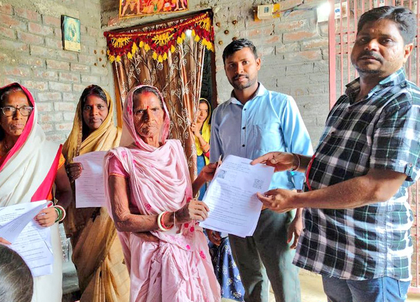Dead, duplicates, and gone: Why are some leaders fighting to keep them in Bihar’s voter list?
By IANS | Updated: July 22, 2025 19:04 IST2025-07-22T18:55:21+5:302025-07-22T19:04:33+5:30
New Delhi, July 22 In a development that has left political observers perplexed, a section of national and ...

Dead, duplicates, and gone: Why are some leaders fighting to keep them in Bihar’s voter list?
New Delhi, July 22 In a development that has left political observers perplexed, a section of national and state leaders from certain political parties in Bihar is reportedly pushing for the inclusion of deceased, permanently shifted, duplicate, and untraceable voters in the draft electoral rolls—despite data emerging from the ongoing Special Intensive Revision (SIR) suggesting their ineligibility.
According to official figures as of July 21 shared by Election Commission, the SIR exercise has found over 52.3 lakh electors not present at their registered addresses across the state. Of these, nearly 18.5 lakh were confirmed to be deceased, 26 lakh had permanently shifted, and around 7.5 lakh were found enrolled at multiple places. An additional 11,000 voters could not be traced at all.
Yet, some political figures have questioned the removal of these names from the electoral rolls, a move that experts and political analysts view with concern.
According to sources, the entire purpose of a Special Intensive Revision is to clean up the electoral rolls and ensure only eligible citizens are listed. How can any party justify retaining names of people who are dead or have permanently relocated? they ask.
Political analysts believe this unusual demand could have deeper political motivations. Many say that there’s clearly an attempt by some quarters to delay or discredit the revision process. If the parties’ own Booth Level Agents (BLAs) have confirmed the absence of these voters, and shared lists with the Election Commission, how can their leadership now seek to reinclude these names? It’s contradictory and raises questions about intent.
Over 1.5 lakh BLAs appointed by the 12 major political parties have been involved in the verification process. According to officials, these agents have shown “remarkable cooperation” in the house-to-house verification efforts led by Booth Level Officers (BLOs).
Instead of standing behind the field-level workers—many of whom belong to their own party—some leaders are undermining the process, a source remarked. This isn’t just obstruction; it looks like a deliberate attempt to politicise a technical, citizen-focused exercise, sources said.
Observers say if party leaders believe genuine voters have been mistakenly deleted, they must present specific cases rather than calling for blanket inclusion of ineligible categories. Otherwise, it will seem they have something to gain from keeping ghost voters in the system.
With the SIR process still ongoing, the Election Commission has reiterated its commitment to ensuring that no eligible voter is left out—and no ineligible name is retained.
Disclaimer: This post has been auto-published from an agency feed without any modifications to the text and has not been reviewed by an editor
Open in app